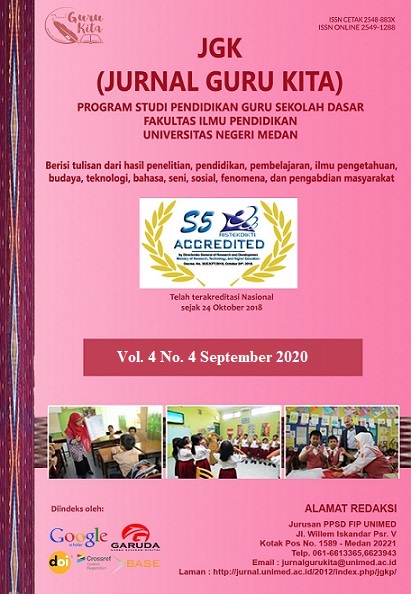PERAN KEPEMIMPINAN KEPALA MADRASAH DALAM PENINGKATAN MUTU PENDIDIKAN DI MTsN 3 MEDAN
DOI:
https://doi.org/10.24114/jgk.v7i1.44753Keywords:
Leadership, Head master, Education qualityAbstract
The person responsible for coordinating efforts to improve education standards is the head of the madrasah. Because of the quality of education, graduates must be skilled, competent with appropriate capacities, honest, and moral. improve the quality of higher education in various ways, including improving educational facilities, producing and obtaining teaching materials, developing and perfecting curricula, evaluating systems, and training education staff. The descriptive analysis approach is combined with the qualitative approach in this study. Descriptive analysis is a research method that uses observable behavior and the written or spoken words of people who are used as research subjects to produce descriptive data that provide details about the phenomenon under study. Judging from the test findings, the form of authority used by the madrasah leadership at MTsN 3 Medan included that the madrasah leadership generally spoke with all heads of the teaching group, staff, and organizations before making any decisions.References
Arcaro, J. (2006). Pendidikan Berbasis Mutu. Yogyakrta. Pustaka Pelajar.
Andang. (2014). Manajemen dan Kepemimpinan Kepala Sekolah, Yogyakarta: Ar Ruzz Media
Arikunto, S. (2002. Prosedur Penelitian Suatu Pendekatan Praktek. Edisi Revisi V. Jakarta: Penerbit PT Rineka Cipta
A™yuni, Q., (2016), Pola Kepemimpinan Kepala Madrasah Aliyah Negeri Kisaran dalam Pelaksanaan pekerjaan di kabupaten asahan, Jurnal Administrasi Publik, 7(1):64-76.
Basri, H. (2014). Kepemimpinan KepalaMadrasah , Bandung: CV Pustaka Setia.
Burhanuddin, (2004). Gaya Kepemimpinan Ideal, Bandung: Press
Danim, S. (2010). Kepemimpinan Pendidikan (kepemimpinan jenius (IQ+EQ), Perilaku Motivational dan mitos. Bandung: Alfabeta.
Deepublish. Jerry H. Makawimbang. (2012). Kepemimpinan Pendidikan Yang Bermutu. Bandung: Alfabeta.
Harahap, Nursapiah. (2020). Penelitian Kualitatif. Sumatera Utara: wal ashri publishing.
Handoko. (1997). Sukses Kepemimpinan, Surabaya: Erlangga
Hidayati, (2015). Kepemimpinan dan Peningkatan Mutu Pendidikan. Jurnal Tarbiyah.
Jelantik, K. (2012). Menjadi Kepala Madrasah Yang Profesional. Yogyakarta:
Juliantoro, M. (2017). Peran Kepala Madrasah Dalam Meningkatkan Mutu Pendidikan.
Jurnal al-hikmah, Vol.5
Maryati. (2016). Pola Kepemimpinan Kepala Madrasah Dalam Meningkatkan Pendidikan, Quality, Vol.4(2), 170.
Milles dan Huberman. (1992). Analisis Data Kualitatif, Jakarta: Universitas Indonesia Press, hlm. 16.
Moedjiono, I. (2002). Kepemimpinan dan Keorganisasian. Jogjakarta: UII Press
Moleong, Lexy J. (2006), Metodologi Penelitian Kualitatif, Bandung: Remaja Rosdakarya.
Mulyasa, E (2007). Menjadi Kepala Madrasah Profesional. Bandung: PT Remaja Rosdakarya.
Mustapid, Hasibuan A.I. & Wijaya, C. (2019). Peran Kepemimpinan Kepala Madrasah dalam Meningkatkan Mutu Pendidikan di MTs. Swasta Miftahul Falah Sunggal Kabupaten Deli Serdang. Anthropos: Jurnal Antropologi Sosial dan Budaya, 4 (2): 201-210.
Nurul H. (2016). Kepemimpinan Visioner Kepala Madrasah Dalam Meningkatkan Mutu Pendidikan. Yogyakarta: Ar-ruzz Media.
Priyono. 2016. Metodologi Penelitian. Sidoarjo: Zitafama Publishing.
Rachamnsyah. (2008). Kepemimpinan Otoriter, Demokratis dan Paternalistik, Jakarta: Sinar Grafika.
Sagala, S. H. (2010). Kemampuan Profesional Guru dan Tenaga Kependidikan. Bandung. Alfabeta
Siregar, A.B., Kusmanto, H. Isnaini. (2016), Evaluasi Kinerja Kepala Madrasah Menengah Kejuruan Sekabupaten langkat tahun 2015, Jurnal Administrasi Publik, 6(1):13-19.
Sarwono, J. (2006). Metode Penelitian Kualitatif dan Kuantitatif. Bandung: Graha Ilmu
Suderadjat, H. (2005). Manajemen Peningkatan Mutu Berbasis Sekolah, Bandung: CV. Cipta Cekas Grafika
Sugiyono. (2009). Metode Penelitian Pendidikan Kuantitatif Kualitatif dan R&D. Bandung: Alfabeta.
Wahjosumidjo. (2010). Kepemimpinan Kepala Madrasah . Jakarta: Raja Grafindo Persada.
Downloads
Published
How to Cite
Issue
Section
License
Authors published with the JGK (Jurnal Guru Kita) agree to the following terms:
- Authors retain copyright and grant the journal the right of first publication with the work simultaneously licensed under a Creative Commons Attribution License (CC BY-SA 4.0) that allows others to share the work with an acknowledgment of the work's authorship and initial publication in this journal.
- Authors are able to enter into separate, additional contractual arrangements for the non-exclusive distribution of the journal's published version of the work (e.g., post it to an institutional repository or publish it in a book), with an acknowledgment of its initial publication in this journal.
- Authors are permitted and encouraged to post their work online (e.g., in institutional repositories or on their website) prior to and during the submission process, as it can lead to productive exchanges, as well as earlier and greater citation of published work. (See The Effect of Open Access)













